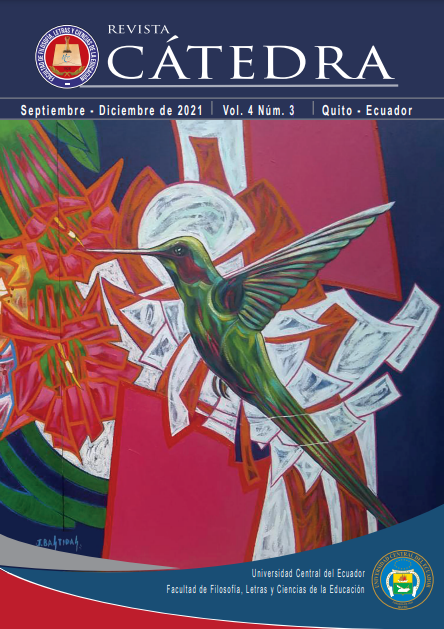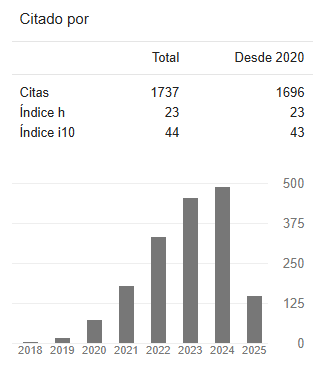Self-regulation of learning in university students: a descriptive study
DOI:
https://doi.org/10.29166/catedra.v4i3.3048Keywords:
self-regulation of learning, cognitive management, context management, university students, comprehension assessment, planning, motivation managementAbstract
Among the fundamental capacities that the human being must have to achieve successful development at a personal, academic and professional level is the self-regulation of learning. Managing resources and strategies in knowledge construction processes is essential. Only in this way can goal-oriented performance and training results be planned, executed, monitored and evaluated. Within this order of ideas, the objective of this work was to determine the self-regulation of learning in students of the Faculty of Philosophy, Letters and Education Sciences, of the Central University of Ecuador. It was developed from a quantitative approach and a descriptive level, being a cross-sectional study. The discoveries found allowed us to conclude that those research group mostly present low and medium-low levels of self-regulation, with similar results in the analysis by sex and by level of training. Likewise, it was possible to identify that the levels: low and medium low are prevalent among students in the various factors of this variable. Being these: planning, cognition management, motivation management, understanding assessment and context management. When contrasting these results with other studies, coincidences and contradictions were observed. This indicates the need to deepen the investigation of this variable. It is suggested to generate curricular innovations in university education that allow the development of self-regulation of learning throughout their professional training.
Downloads
References
Bandura, A., Barbaranelli, C., Caprara, G. V., y Pastorelli, C. (2001). Self-efficacy beliefs as shapers of children’s aspirations and careertrajectories. Child Development, 72 (1), 187–206. https://www.uky.edu/~eushe2/Bandura/Bandura2001CD.pdf
Biggs, J. (1985). The role of meta-learning in study processes. British Journal of Educational Psychology,55 (1),185-212. https://www.researchgate.net/publication/229763155_The_Role_of_Metalearning_in_Study_Processes
Boekaerts, M., y Corno, L. (2005). Self-regulation in the classroom: a perspective on assessment and intervention. Applied psychology: an international review, 54(2), 100-231. http://sohs.pbs.uam.es/webjesus/motiv_ev_autorr/lects%20extranjeras/self%20regulation.pdf
Biggs, J. (1993). What do inventories of students’ learning processes really measure? A theoretical review and clarification. British Journal of Educational Psychology, 63, 3-19. https://www.researchgate.net/publication/14732145_What_Do_Inventories_of_Students'_Learning_Processes_Really_Measure_A_Theoretical_Review_and_Clarification
Catuara, S. (2018) Las neuronas espejo. Aprendizaje, imitación y empatía. Ed. Bonalletra Alcompas, S.L.
Castro Pereira. M. (1989), El adulto y su aprendizaje: referencias teóricas y caracterización para el aprendizaje en el contexto de la andragogía, Informe General y Conclusiones de la IX Conferencia Regional Interamericana de Andragogía. Lima, 89-118.
Chan, E., & León, E. (2017). Exploración del proceso de aprendizaje autorregulado de estudiantes universitarios mayahablantes. Investigación educativa de la REDIECH, 8(1)91-110. https://www.rediech.org/ojs/2017/index.php/ie_rie_rediech/article/view/37/32
Cruz, M., Cortés, P., Álvarez, N. (2017). El modelo de Autorregulación y el Aprendizaje Matemático. Congreso Nacional de Investigación Educativa, San Luis Potosí, México, https://www.comie.org.mx/congreso/memoriaelectronica/v14/doc/2072.pdf
Escorcia, D. (2010). Conocimientos metacognitivos y autorregulación: una lectura cualitativa del funcionamiento de los estudiantes universitarios en la producción de textos. Avances En Psicología Latinoamericana,28(2),265-277. https://revistas.urosario.edu.co/index.php/apl/article/view/1456
Gaeta-González, M (2006) Estrategias de autorregulación del aprendizaje: contribución de la orientación de meta y la estructura de metas del aula. Revista Electrónica Interuniversitaria de Formación del Profesorado,9(1),1-8. http://www.aufop.com/aufop/home/
García-Gajardo, F., Fonseca-Grandón, G y Concha-Gfell, L (2015) Aprendizaje y rendimiento académico en educación superior: un estudio comparado. Actualidades Investigativas en Educación,15(3),1-26. https://www.redalyc.org/pdf/447/44741347019.pdf
González, A. (2001). Autorregulación del aprendizaje: una difícil tarea. IberPsicología 6 (1),1-25. https://www.researchgate.net/publication/28059660_Autorregulacion_del_ap.rendizaje_una_dificil_tarea/citations
Gravini-Donado, M., Ortiz-Padilla, M. E., & Campo-Ternera, L. A. (2016). Autorregulación para el aprendizaje en estudiantes universitarios. Educación Y Humanismo, 18(31), 326-342. https://doi.org/10.17081/eduhum.18.31.1382
Hendrie-Kupczyszyn, K y Bastacini, M (2016) Autorregulación en estudiantes universitarios: Estrategias de aprendizaje, motivación y emociones. Revista Scielo, 44 (1), 1-18 https://www.scielo.sa.cr/pdf/edu/v44n1/2215-2644-edu-44-01-00327.pdf
Hernández-Barrios, A y Camargo-Uribe, A (2017) Autorregulación del aprendizaje en la educación superior en Iberoamérica: una revisión sistemática. Revista Latinoamericana de Psicología, 49(1), 146-160. https://psycnet.apa.org/record/2017-54038-008
Hernández-Barrios, A., & Camargo-Uribe, Á. (2017). Adaptación y validación del Inventario de Estrategias de Autorregulación en estudiantes universitarios. Suma Psicológica, 24(1), 9–16. https://reader.elsevier.com/reader/sd/pii/S0121438117300048?token=1B252F329DDB0B6435F5CB19ECED9B3B832FCFB026A72E310B369F7C608347DB69D6CDDE45D0162736D1D3C695AE9667
Kaufmann D., Schraw G., Lehman S., (2006) Self-Regulated Learning, ResearchGate 1063-1073,https://www.researchgate.net/publication/229971208_Self-Regulated_Learning
López, S. (1992) Autorregulación y desarrollo de capacidades que incrementan la coherencia entre juicio y acción. Comunicación, lenguaje y Educación 4 (1), 111-118. https://doi.org/10.1080/02147033.1992.10821040
Luy-Montejo, C. (2019). El Aprendizaje Basado en Problemas (ABP) en el desarrollo de la inteligencia emocional de estudiantes universitarios. Propósitos y Representaciones, 7(2), 353-383. http://dx.doi.org/10.20511/pyr2019.v7n2.288
Nuñez, J., Amieiro, N., Álvarez, D., García, T., y Dobarro, A. (2015) Escala de Evaluación de la Autorregulación del Aprendizaje a partir de Textos (ARATEX-R). European Journal of Education and Psychology, 8(1), 9-22. https://www.redalyc.org/pdf/1293/129343965002.pdf
Ozan, C., Kerim , G., Bay, E., & Celkan, H. (2012). Self-regulated learning strategies skills and self-efficacy perceptions. Social and Behavioral Sciences, 46 (2012) 1806-1811 https://www.researchgate.net/publication/271881025_A_Study_on_the_University_Students'_Self-Regulated_Learning_Strategies_Skills_and_Self-Efficacy_Perceptions_in_Terms_of_Different_Variables
Panadero, E. & Alonso-Tapia, J. (2014) ¿Cómo autorregulan nuestros alumnos? Revisión del modelo cíclico de Zimmerman sobre autorregulación del aprendizaje. Anales de psicología, 30 (2), 450-462. https://www.researchgate.net/publication/260684356_Como_autorregulan_nuestros_alumnos_Modelo_de_Zimmerman_sobre_estrategias_de_aprendizaje/references
Pardo, N. (2015). Estrategias autorreguladoras para la comprensión de textos académicos en los estudiantes universitarios. Horizontes Pedagógicos, 17(2), 29-38. https://horizontespedagogicos.ibero.edu.co/article/view/17203/765
Prados, M., Sánchez, V., Sánchez-Queija, I., Del Rey, R., Pertegal, M., Reina, M., Ridao, P., Ortega, F., Mora, J (2014) Manual de Psicología de la Educación. Pirámide https://tecnicasdeaprendizajeefpem.files.wordpress.com/2018/01/manual-de-psicologia-de-la-educ.pdf
Pintrich, P. R. (2000). The role of goal orientation in self-regulated learning. En M. Boekaerts, P. Pintrich, y M. Zeidner. Handbook of selfregulation. Academic Press, 452-502.
https://ssrlsite.files.wordpress.com/2018/01/pintrich-2005-the-role-of-goal-orientation-in-srl.pdf
Rosário, P., González-Pienda, J. A., Pinto, R., Ferreira, P., Lourenço, A., y Paiva, O. (2010). Efficacy of the program “Testas’s (mis)adventures” to promote the deep approach to learning. Psicothema, 22, 828-834. http://www.psicothema.com/pdf/3808.pdf
Rosário, P., Pereira, A., Högemann, J., Nunes, A. R., Figueiredo, M., Núñez, J. C., Fuentes, S., Gaeta, M.L. (2014). Autorregulación del aprendizaje: una revisión sistemática en revistas de la base SciELO. Universitas Psychologica, 13(2), 781-798. https://www.redalyc.org/articulo.oa?id=64732221031
Zimmerman, B. J. (2001). Theories of self-regulated learning and academic achivement: An overview and analysis. B. J. Zimmerman & D. H. Schunk. Self-regulated learning and academic achievement: Theoretical perspectives, Lawrence Erlbaum Associates Publishers. (2) 1-38.
Zimmerman, B.J. & Martinez-Pons, M. (1998). Construct validation of a strategy model of student self-regulated learning. Journal of Educational Psychology, 80(3), 284-290.
Zimmerman, B. J., & Schunk, D. H. (2011). Self-regulated learning and performance: An introduction and an overview. B. J. Zimmerman & D. H. Schunk. Handbook of self-regulation of learning and performance. Routledge. 1-12.
Zimmerman, B. J. (2008). Investigating self-regulation and motivation: Historical, background, methodological developments, and future prospects. American Educational Research Journal, 45, 166-183. https://www.researchgate.net/publication/250184865_Investigating_Self-Regulation_and_Motivation_Historical_Background_Methodological_Developments_and_Future_Prospects









